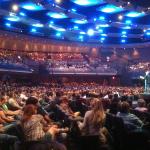“Who are these who fly like a cloud, and like the doves to their windows?” someone asks in Isaiah 60:8. It’s a puzzling question in a context having to do with the assembling of Gentiles at Zion for worship (vv. 6-7, note gold, frankincense, flocks and rams that ascend on Yahweh’s altar and are accepted). What hath a cloud to do with Gentiles? What hath doves to do with worship? The context gives us several possibilities. Perhaps “these” that fly... Read more




















